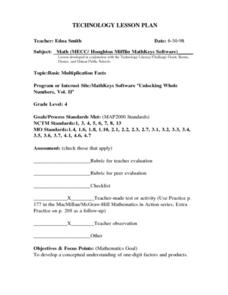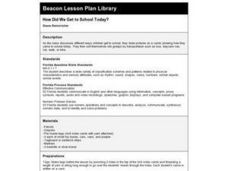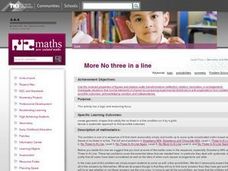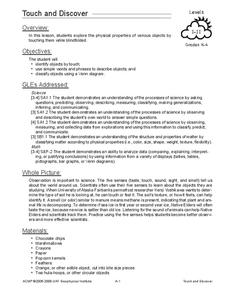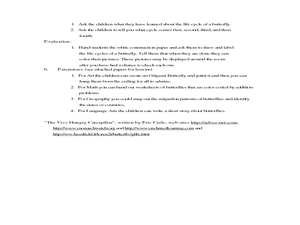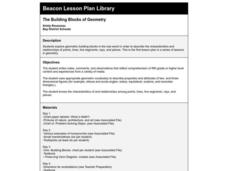Illustrative Mathematics
Comparing Products
How can 5th graders show understanding that 30 x 225 is half of 60 x 225 without completing the computation? They can use an area model and draw it out. An array, or an open array, is an area model that allows for young learners to...
Curated OER
Basic Multiplication Facts - MathKeys Software
Young scholars explore multiplication concepts. In this multiplication lesson, students define "array" and draw several arrays to represent multiplication number sentences. Young scholars construct arrays on the computer...
Curated OER
Blubber Gloves
The ways that animals adapt to their environments is quite remarkable. In this life science lesson, fifth graders take a look at some of the ways that aquatic animals that live in Arctic or Antarctic waters survive. They perform an...
Curated OER
Polygons All Around Us!
Students explore the concept of polygon properties. In this polygon properties lesson plan, students draw polygons with different numbers of sides such as pentagons, octagons, hexagons, etc. Students identify different geometric shapes...
Curated OER
Counting By 5s
Second graders count by 5's to 100. In this math lesson conducted on the 100th day of school, 2nd graders use picture stamps in the KidPix program to count by 5's and get to 100.
Curated OER
Odd Thing Out
Students listen to the math problem provided and work in groups to solve. They think about the objects and write down their information in a table. Class construct the table on a large piece of paper that can be put on the wall after the...
Curated OER
Patterns
Second graders create an ABAB pattern with their name. In this early elementary math lesson, 2nd graders first model their names in an ABAB pattern with unifix cubes. They then recreate the pattern using letter stamps on KidPix.
Curated OER
Tantalizing Tessellations - Lesson I
Middle schoolers complete a chart (KWL) as a pre-assessment, study the history of tessellations (tilings), investigate the properties of tessellations, and make and evaluate photographs of "found tessellations" for a...
Curated OER
Paint Plus
Using the computer and the Paint program, Students explore the different tools available in the paint program, and then create a picture showing two sets of pictures and an equation.
Curated OER
Irregular Fractals
Students study and research irregular fractals and construct a few based on their research. Students practice pattern recognition skills and plane geometry skills calculating dimensions on the Fractured Pictures activity.
Curated OER
And The Twelfth One Is
Ninth graders play guess my shape (either describe or use a feely bag to introduce the 3 shapes in the problem.) As they are identified put them in an order as shown in the problem. As the students work on the problem in pairs teacher...
Curated OER
"Ball Bounce" Quadratic Functions
Young scholars manipulate a ball and explore quadratic functions. In this algebra lesson, learners analyze the graph of a quadratic function. They identify quadratic properties.
Curated OER
More No-Three-In-A-Line
Fourth graders read Mary's problem and make sure that they examine it.
After some discussion, let the class work on the problem in their groups.
They then take turns in putting a picture of their arrangement on the board.
Curated OER
Joining (Addition) & Separating (Subtraction) - Result Unknown
How much is the total? How many more is left? These basic questions are asked of students through two story problems that involve catching fish on a weekend fishing trip and goal of reading a certain number of books. Your learners will...
Curated OER
Dr. Seuss: "Old Fish, New Fish"
In this Dr. Seuss worksheet, students find opposites of fish from the story One Fish Two Fish...drawing lines to the opposites of pictures given. A website reference is given for additional resources.
Curated OER
Touch and Discover
Students identify the physical properties of items using the sense of touch. In this touch and discover lesson, students describe items. Students sort items using a Venn diagram.
Curated OER
The Lifecycle of a Butterfly
Students study the life cycle of the butterfly. For this butterfly life cycle lesson, students examine and discuss a large diagram of the four stages of the butterfly life cycle. They read books and access web sites that extend their...
Curated OER
How Many More Fish?
Second graders construct a rich conceptual schema of subtraction in the comparative mode. They answer such questions as "How many more?" and "How many less?" They investigate properties of subtraction, represent subtraction in objects...
Curated OER
Multiplication: One and Two Digit Numbers
For this multiplication worksheet, students multiply one digit numbers by two digit numbers and three digit numbers. Students complete 28 problems.
Curated OER
Shape and Space: Symmetry
Students discuss and work with lines of symmetry. In this symmetry lesson, students start with a warm up activity on metric conversion. They talk about the definition of symmetry and reflection before completing a worksheet.
Curated OER
Anything I Can Do You Can Do Better
Students complete a two-week unit involving design and construction concepts. They watch a PowerPoint presentation about geometric shapes, draw the fourteen shapes incorporated in bridge construction, and in small groups design, build,...
Curated OER
The Building Blocks of Geometry
Fifth graders explore geometric building blocks in the real world in order to describe the characteristics and relationships of points, lines, line segments, rays, and planes. This is the first lesson plan in a series of lessons in...
Curated OER
Pollution Search
First graders identify forms of pollution and describe effects that various pollutants can have on people, wildlife, and plants; students describe relationships between various forms of pollution and human actions.



